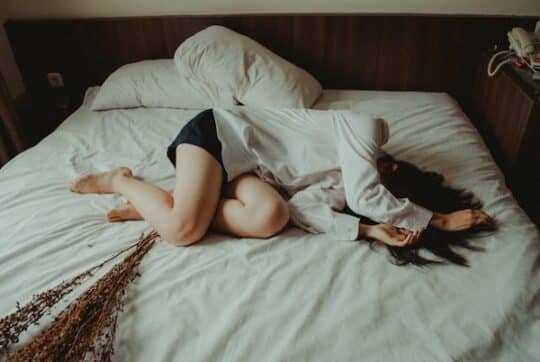(UPDATED) For many artists with depression, the pain within often helps them create influential art. The trope of the tortured creative genius is a real thing backed by science. A study from the journal Nature found that creative genius and mental disorders are connected at a genetic level.
So, if you’re an artist feeling depressed, you should know you are not alone and you are not crazy. Even some of the world’s most beloved artists have battled depression. Goya, Vincent Van Gogh, Georgia O’Keefe, Mark Rothko, Jackson Pollock, and Alice Neel have battled mental illness.
So why – if it’s so well established that depression and creativity are often linked – do artists with depression have such a difficult time confronting their demons? Perhaps because it’s more complicated than it looks to admit you’re not well and need help.
The feeling of not being able to breathe, as if the world is swallowing you whole, is terrifying. It would make anyone feel like they’re losing grip on reality, but it’s just a feeling. And like the waves of the ocean, feelings come and go. As soon as you begin to feel emotionally depleted, take pause. Here, we ask mental health professionals to unveil some self-care techniques to help you get past your darker days.
Artists and Depression: A Common Pairing
Depression itself is difficult to live with, and when compounded by challenges in your creative process, it can seem like artists and depression share an uncommon bond. For writers, the months of rejected pitches and declined pieces can feel like years of denial.
Creating a new series of works can often feel like an unachievable climb for artists with depression. The same goes for musicians or designers when the inspiration stops coming. Difficult moments are typical in the lives of artists, so we must be careful not to slip into dark oblivion.
Megan Gunnell, LMSW, is a psychotherapist and international retreat leader in Grosse Pointe, MI. She explains that “Creatives are sometimes highly sensitive souls. Our need for restoration and renewal can be higher than others. We can also be overstimulated easily and need opportunities for quietude and replenishment. “She notes that these feelings must be identified and dealt with if they are to pass.
Artists with Depression and Self-Care
“When we open ourselves up to using our senses to experience the moment and bring our full presence and attention to what’s in front of us, it can increase our thoughts and experiences of gratitude and joy,” Gunnell says. “Self-care is always important too. When we feel overloaded, situationally depressed, or burned out, it’s an indicator our self-care needs our attention. When our self-care is high, our resiliency and coping increase.”
Take a look at these factors to assess which of them may need additional support:
- sleep
- nutrition
- hydration
- exercise and outlet for stress/recreation
- leisure or hobby activities
For many artists with depression, even these seemingly easy-to-manage factors can be daunting. But you don’t have to deal with them all at once. It’s ok if you can’t summon the strength to get out of bed or the house for exercise or leisure. Don’t waste energy pitying yourself for not being able to get up and go. Feeling depressed is a serious matter; if your body is telling you it needs rest, it probably does. So focus on what you can accomplish.

It’s ok if you can’t get out of bed. Don’t waste energy pitying yourself for not being able to get up and go.
Try using essential oils with meditative breathing in moments when you feel restless. If you’re able, order yourself eucalyptus or tea tree essential oil. Unlike the traditional relaxing scent of lavender, eucalyptus and tea tree are powerfully recharging and can help clear the cobwebs of a dreary grey period.
Place a few drops on your pressure points: inside your wrist, behind your ears, and on your temples. Take a few long deep breaths while smelling the scent. It’s a quick fix to knock out some of the looming sadness and help inspire you to get up and move.
Clear your mind, and then try to get up, take a walk, or eat something nutritious. And keep a bottle of water handy to remind you to stay hydrated.
Depression and Creativity Don’t Have to Go Hand-in-Hand
The waiting-for-inspiration myth is a fool’s game, but there is something to be said about creating bard work while you wait for the good stuff to arrive. Sometimes when artists hit a rough patch of inspiration, it feels like the well is dry, and they’ll never create again.
The weight of not being able to create something you think is worthy of your talents can feel crushing, and then the doubt and anxiety can pile on. It’s not an enjoyable time but rarely is your inner monologue correct. Inspiration may be elusive, but it will surely come back.
In the meantime, let yourself create work that may not be your best, just to get it out and to keep your creative juices flowing.
Gunnell suggests searching for ways to be more positive and inspired:
- Going to an art gallery, museum, or creative space (sculpture garden, local gift shop, bookstore, etc.) is a form of self-care that can help artists with depression immensely. It can help us see creativity through a fresh, new lens, expand our minds toward greater possibilities, and inspire us to take risks.
- A beauty or nature walk can be a simple way of re-training your brain to search for the positive. When we intend to seek aesthetic pleasure, we begin to feel a sense of awe and wonder by forces greater than us. Time spent in nature helps us move from a micro-frame to a macro frame, again expanding ourselves into a more significant possibility beyond our momentary struggle and strife.

A nature walk can be a simple way of re-training your brain to search for the positive.
Make a Change in Your Routine
When a person is depressed, they often get into a routine that reinforces their depression. This is especially true for artists because creating art can be an isolating experience. Many artists live alone and work at their home studios. The lack of human interaction can reinforce poor habits, like failing to clean your home or do the laundry. Artists can spend days at home without ever seeing another person. Practices like this can keep a person feeling bad about themselves.
Changing a routine does not need to be complicated. For example, instead of watching TV each night and bingeing on unhealthy food, head to your local coffee shop and spend an hour reading or watching something on your laptop, surrounded by people.
For some artists with depression, the problem is not having enough of a routine and structure to their day. Establishing a better routine can alleviate the symptoms of depression.
Building a healthy new routine can be simple. For example, simply getting up at a set time and getting dressed in the morning rather than lounging in pajamas is a small but potentially significant change to daily habits. Even committing to making your bed every day and doing laundry on a set schedule can make a huge difference.
Changing routines can help rewire the dopamine pathways in the brain, an important brain chemical linked to feelings of happiness. The changes do not need to be significant to have a positive effect.
Reduce your Alcohol Consumption
It’s common to use alcohol to cope with complicated feelings and experiences. A small drink can temporarily lift your spirits and help improve your mood. However, the more you drink, the more likely your emotional state will crash afterward, often making you feel even worse than you did before.
Alcohol is a depressant that interferes with the release of neurotransmitters linked to mood regulation, including serotonin and norepinephrine. So even though alcohol may initially feel like it is helping to improve your mood, it can bring you down even further, leading to the perceived need for another drink to lift your spirits. Limiting your alcohol intake can remove that destructive cycle.
As mentioned earlier, getting enough sleep is essential in managing depression, and drinking can interfere with your sleep-wake cycle and keep you from getting enough REM sleep. That poor night of sleep can make you tired and irritable the next day and also make it tough to concentrate, which in turn affects your creativity, making you feel even more depressed or filled with anxiety.
When you use alcohol as a crutch to manage your negative feelings, you may not take other actions that could help you address those problems effectively. For those who depend on alcohol (or other substances) to help manage their depression, you should consider removing those substances from your life.
Admittedly, this would likely be one of the most challenging tasks to tackle, but it is critical in managing depression. While there are many alcohol moderation programs that you can turn to for help, such as the American Addition Center or Moderation Management, you can also try some small tips to help reduce your daily intake.
- Drink slowly. Sipping your drink can help reduce your overall consumption. You could even use a timer to limit pouring another for two hours.
- Eat before drinking. A nutritious meal may help reduce some of the harmful effects of alcohol. If your stomach is empty when you start drinking, the alcohol will enter your bloodstream faster, making you feel the effects of the drinks more quickly. Also, avoid salty snacks while drinking, as they can make you more thirsty.
- Don’t forget the water. Following each alcoholic beverage with a glass of water can help keep you hydrated.
Members of the Creative Community Should Do Their Part
It’s also on the creative community to step up and care for those around us, especially when they’re not asking for help.
Stephanie Kibbe, a tour manager based in Brooklyn, NY, agrees that it’s essential to recognize that fellow creatives might be going through the same issues. “I think sometimes we forget as a community that just because an artist created art from their pain, it doesn’t always mean that they’ve worked through said pain,” she says.
Case in point: Chester Bennington from Linkin Park displayed his pain very prominently for the world to see, and then we were seemingly blindsided by the news of his suicide. Just one month prior, the music community lost a rock icon when Chris Cornell also took his own life.

Chester Bennington from Linkin Park displayed his pain very prominently for the world to see, and then we were seemingly blindsided by the news of his suicide.
For artists, the path to help can be even more difficult since the creation process can be an isolating experience. Artists often work at home and alone, so lack of contact may not raise any red flags.
It’s essential to stay connected with those you know may be going through hard times or have the ups and downs that often come with depression. It’s up to us to check in on one another.
We often rely on texts and social media, but a conversation can be a compelling way to keep someone’s spirits up. Another person’s voice on the other end of a phone is irreplaceable. Call and leave a message. Tell them you’ve been thinking about them and want to know how they are. You may care for someone deeply, but unless you tell them, they won’t know it. Unless you ask how they are, they won’t share.
There are limits, of course. Kibbe warns that helping a fellow artist with depression shouldn’t take priority over your self-care. “From a self-care standpoint, you have to be careful about committing to being a positive influence in an artist’s life. You have to set clear boundaries so you don’t get sucked into their darkness and revive some of your own demons you’ve already slain. If you aren’t strong enough to hold them up, find someone who is.”
Make your wider creative community aware. Invite your friend to events and orchestrate human connection. If you notice them retreating, take action and talk to them about other ways to get help: support groups, listening sessions, and therapy. According to Gunnell, asking, “What do you need right now?” or “What would be most helpful?” gives the person a sense of control and decision-making power where sometimes that feels strained, difficult, or out of reach. She adds that “… it’s also helpful to remind friends to “be gentle with yourself” which can prompt someone to lean into healthy coping mechanisms without sounding pushy. “
Get Help
Depression is an illness that requires treatment. If you are feeling depressed, call the National Suicide Hotline at 1-800-273-8255. They are available 24 hours a day, seven days a week. If you have creative friends, call them, check up on them, and stop by for a visit. You might not see it, but if you’re in a creative community, there are sure to be people around you suffering right now. Depression is silent but deadly, so let’s embrace the challenge to help save those we love and whose work we treasure.
Have you known any artists with depression? Where there any things you have done that seemed to help? Let us know in the comments.
